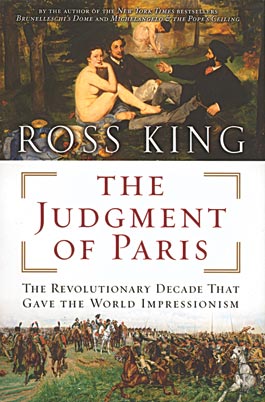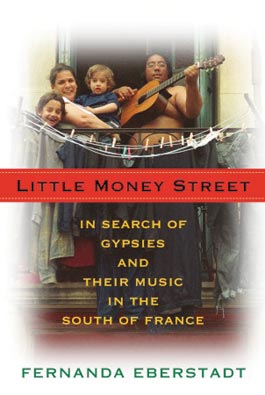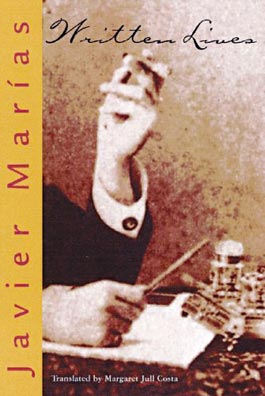home | metro silicon valley index | the arts | books | review
Book Reviews

The Judgment of Paris: The Revolutionary Decade That Gave the World Impressionism
Ross King (Brunelleschi's Dome) deploys two opposing artists to chronicle the rise of Impressionism in France in the late 1800s. "Short, arrogant and densely beaded" Ernest Meissonier's Napoleonic battle scenes impressed viewers with their verisimilitude. At the same time, dapper, debonair and also densely bearded Édouard Manet was jettisoning academic technique in favor of bolder colors and rougher brush strokes. King relates the fortunes of the two men at the annual Salons, where political infighting determined who got exhibition space; the more daring were shunted aside to the Salon des Refusés. None was more outrageous than Manet. Other artists gave their nudes the trappings of classicism—Manet posed his prostitute Olympia, and French audiences reacted with exaggerated shock. Eventually, of course, Manet, and Impressionism, triumphed, and Meissoner slipped into obscurity. King provides a quick-paced chronicle of French social and political life at a time when art seemed to matter in a way we can no longer imagine. (By Ross King; Walker & Company; $28 cloth)
—Michael S. Gant

Little Money Street: In Search of Gypsies and Their Music in the South of France
Entranced by the Gypsy band Tekameli, novelist Fernanda Eberstadt moved to Perpignan, France, near the Spanish border. Warily, the Gypsies accepted her into their highly dramatized lives, poised between "an older, shabbier, weirder Europe" and the coddling embrace of the French welfare state. Eberstadt sounds like Greil Marcus describing a band that has no interest in, no real concept of, fame. Its members prefer a homemade aesthetic: "Every piece of music is bootlegged—recorded from live performances by musicians you have never heard of." This is a beautifully observed record of a people who rebuke everything that Thomas Friedman stands for. (By Fernanda Eberstadt; Knopf; 242 pages; $24.95)
—Michael S. Gant

Written Lives: Essays
The rise of the author tour has made the author interview a staple of newspapers. But what exactly do these stories tell us? Can they traffic in gossip or hearsay? Are they allowed to pivot on a telling anecdote? Before one sniffs at such devices as morally reprehensible, it is worth noting they are exactly what make certain biographies so deliciously readable. In Written Lives, Spain's pre-eminent novelist, Javier Marias, constructs a series of minibiographies of 20 writers from these materials alone. The result is guilty good reading. James Joyce, we learn, "would not deign to open his mouth" while eating out, expecting "to be kept entertained with chatter while he remained silent." Isak Dinesen apparently subsisted on champagne and oysters. Arthur Miller once politely inquired which doctor recommended this diet, and Dinesen barked back, "Doctor? The doctors are horrified. ... I am an old woman, and I eat what agrees with me." Written Lives moves from one such tale to the other, some of them surprising, other confirming our suspicions. Malcolm Lowry once sold the clothes off his back to buy a bottle of gin. Emily Bronte learned to fire a pistol at a young age and was an addict of target practice. Telescoped into the present, these details bring vague lives into sudden focus. They make writers human, perhaps painfully so. As Marias writes, "Posterity always has the advantage of enjoying the work of writers without having the bother of putting up with the writers themselves." These essays remind us that this is only partly true, because, when it comes down to, authors might write the books. When they're dead, we write their lives. (By Javier Marias, translated by Margaret Jull Costa; New Directions; 200 pages; $22.95 cloth)
—John Freeman
Send a letter to the editor about this story.
|
|
|
|
|
|